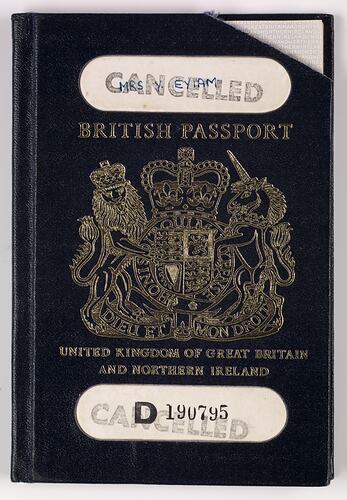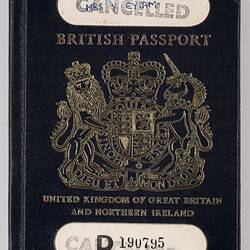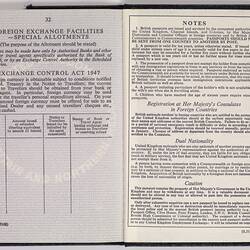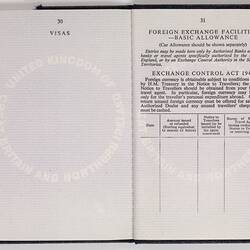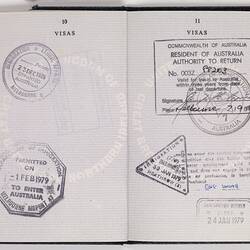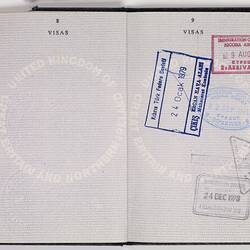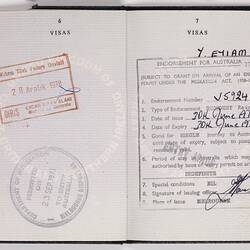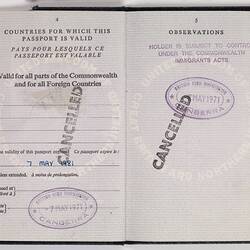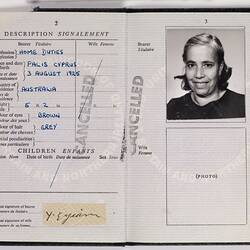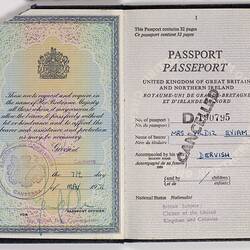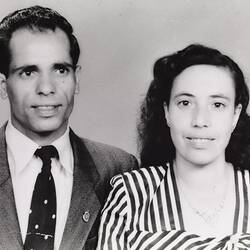Summary
British passport issued to Yildiz Eyiam by the British High Commission in Canberra in 1971. Although a permanent resident of Australia, Yildiz remained a British citizen and required a re-entry permit for Australia whenever leaving the country, according to the Migration Act.
Yildiz Dervish, born in 1925, migrated from Polis in north-west Cyprus on the 'Corsica' in December 1951 and arrived at Station Pier in Melbourne in January 1952.
Yildiz had married Redjeb Eyyam by proxy (interestingly, the marriage permit indicates that Redjeb was present at the ceremony and a proxy stood in for Yildiz, suggesting that the ceremony took place in Australia).
Redjeb, born in 1922, had already migrated to Melbourne in 1949 to escape the economic hardships of post World War II Cyprus. The couple had never met. His name was changed to Eyiam at the passport office in Cyprus. Neither spoke English and they were among only a small number of Turkish Cypriot migrants to come out to Australia.
Redjeb found no work in his trade as a bootmaker and worked in factories, taking in boarders to help pay the mortgage in Footscray. The couple had four children and over the years sponsored other relatives to migrate to Australia. Yildiz returned to Cyprus a number of times; Redjeb never went back.
Physical Description
Passport with dark blue hard cover, and text and British coat of arms printed in gold. Top right hand corner clipped. Contains 32 pages including bearer's name and personal details handwritten in blue ink, black and white photograph of bearer (Yildish Eyiam) and series of international entry permit stamps and Australian re-entry stamps. Front cover and several pages stamped 'CANCELLED'.
Significance
This item is part of a collection which represents a small and lesser known community of migrants in Melbourne - Turkish Cypriots. The collection of photographs, documents and the suitcase also all help to tell stories relating to proxy marriage (common particularly amongst the Italian, Greek and Maltese migrants), and the practice of changing the names of migrants both before and after arrival in order to adapt to the demands and expectations of an English-speaking country.
More Information
-
Collecting Areas
-
Acquisition Information
Donation from Sherife Seyit, 13 Jul 2011
-
Issued To
Mrs Yildiz Eyiam (Eyyam), Canberra, Australian Capital Territory, Australia, 7 May 1971
-
Issued By
United Kingdom: Government, Canberra, Australian Capital Territory, Australia, 07 May 1971
Issued by the British High Commission, Canberra -
Inscriptions
Cover Title: 'British Passport/United Kingdom of Great Britain and Northern Ireland'
-
Classification
-
Category
-
Discipline
-
Type of item
-
Overall Dimensions - Closed
100 mm (Width), 150 mm (Height)
-
Keywords
